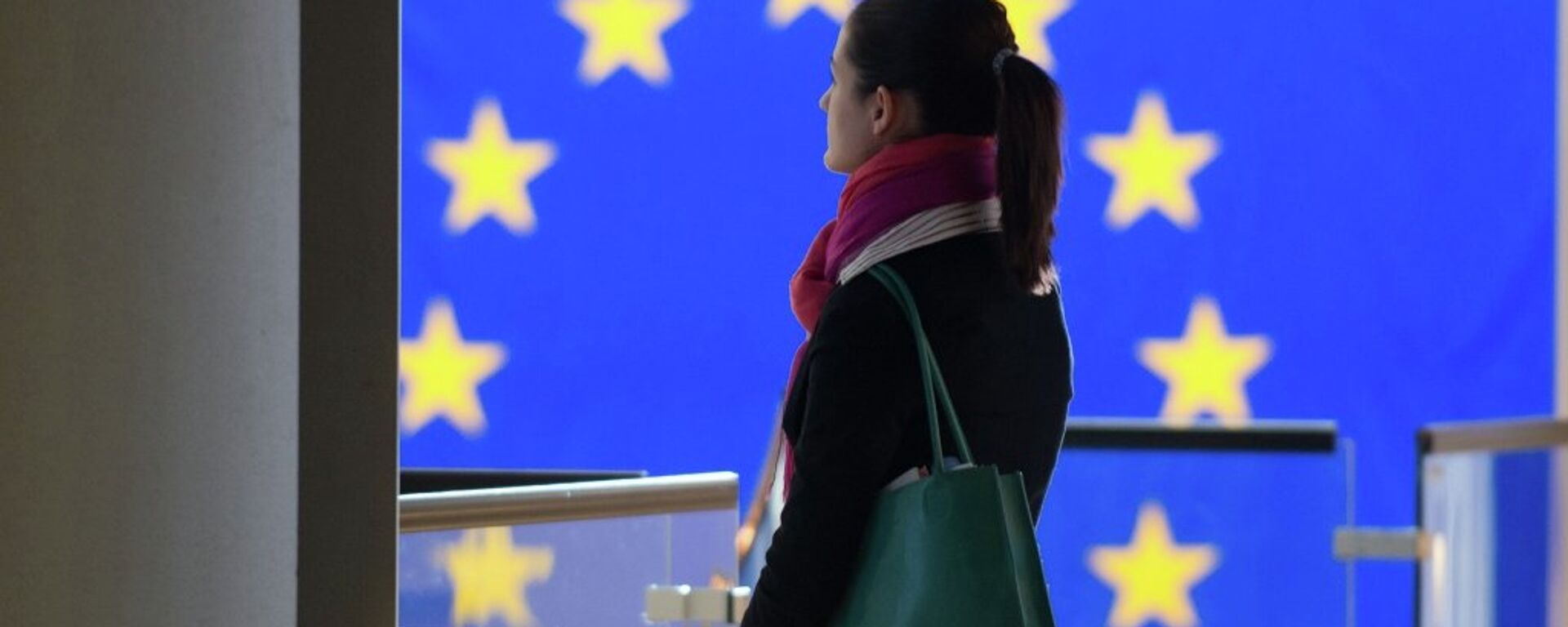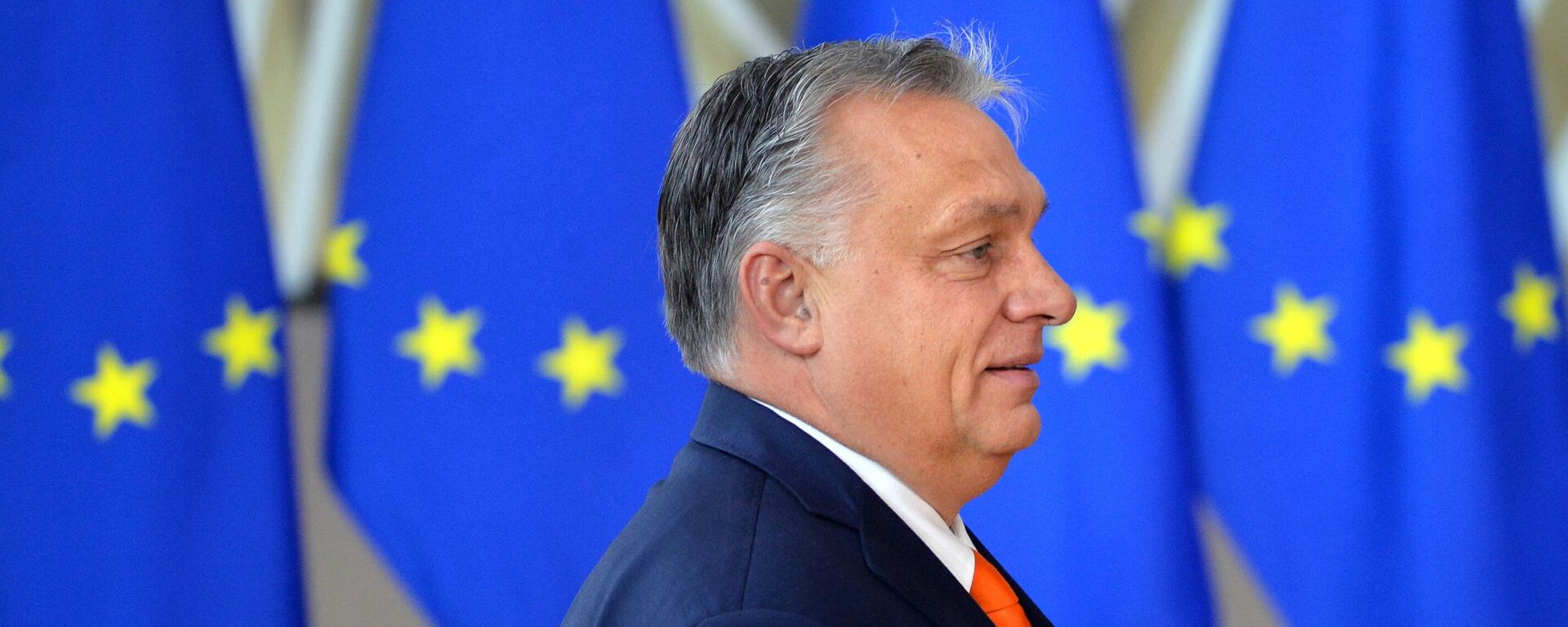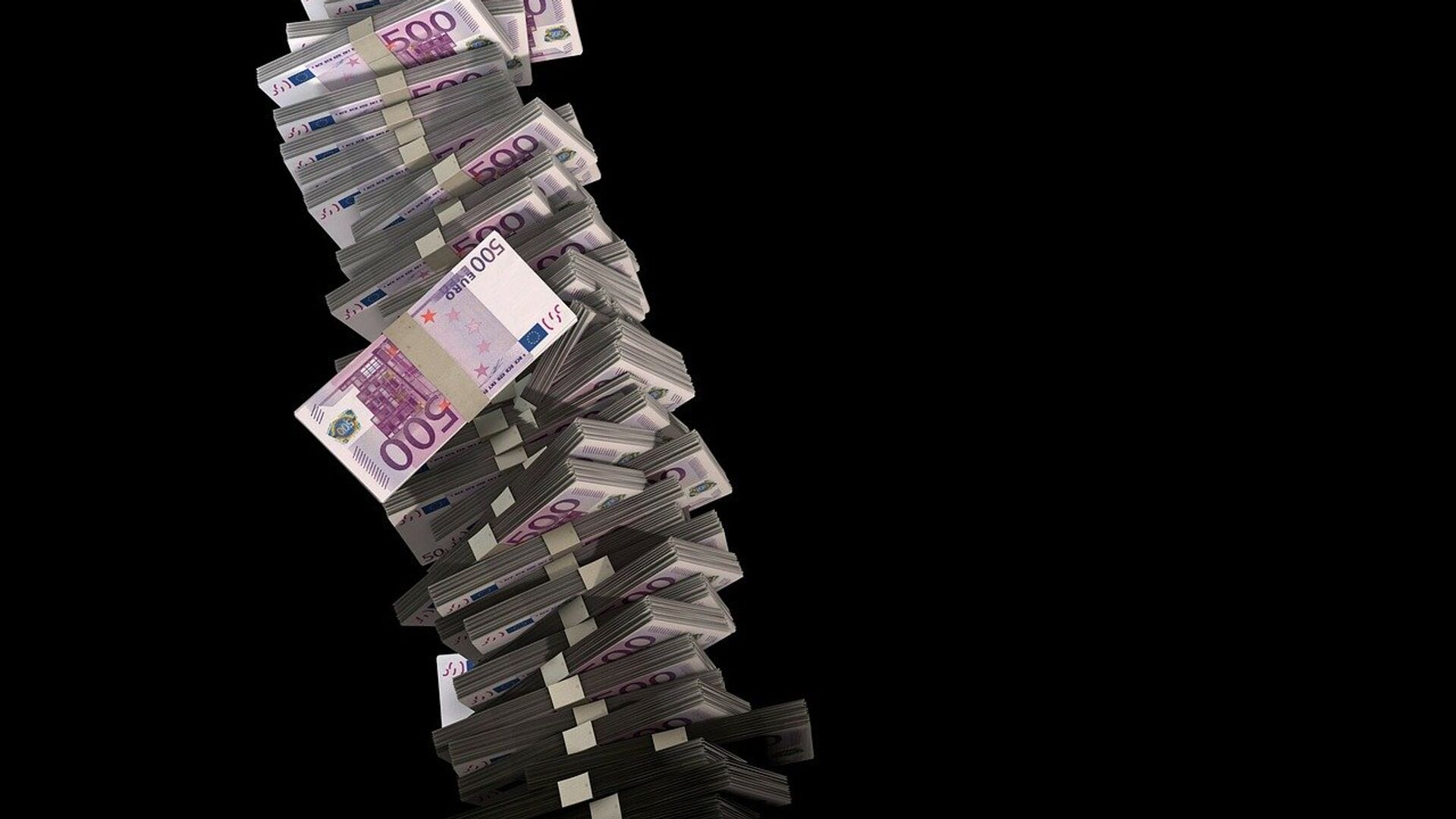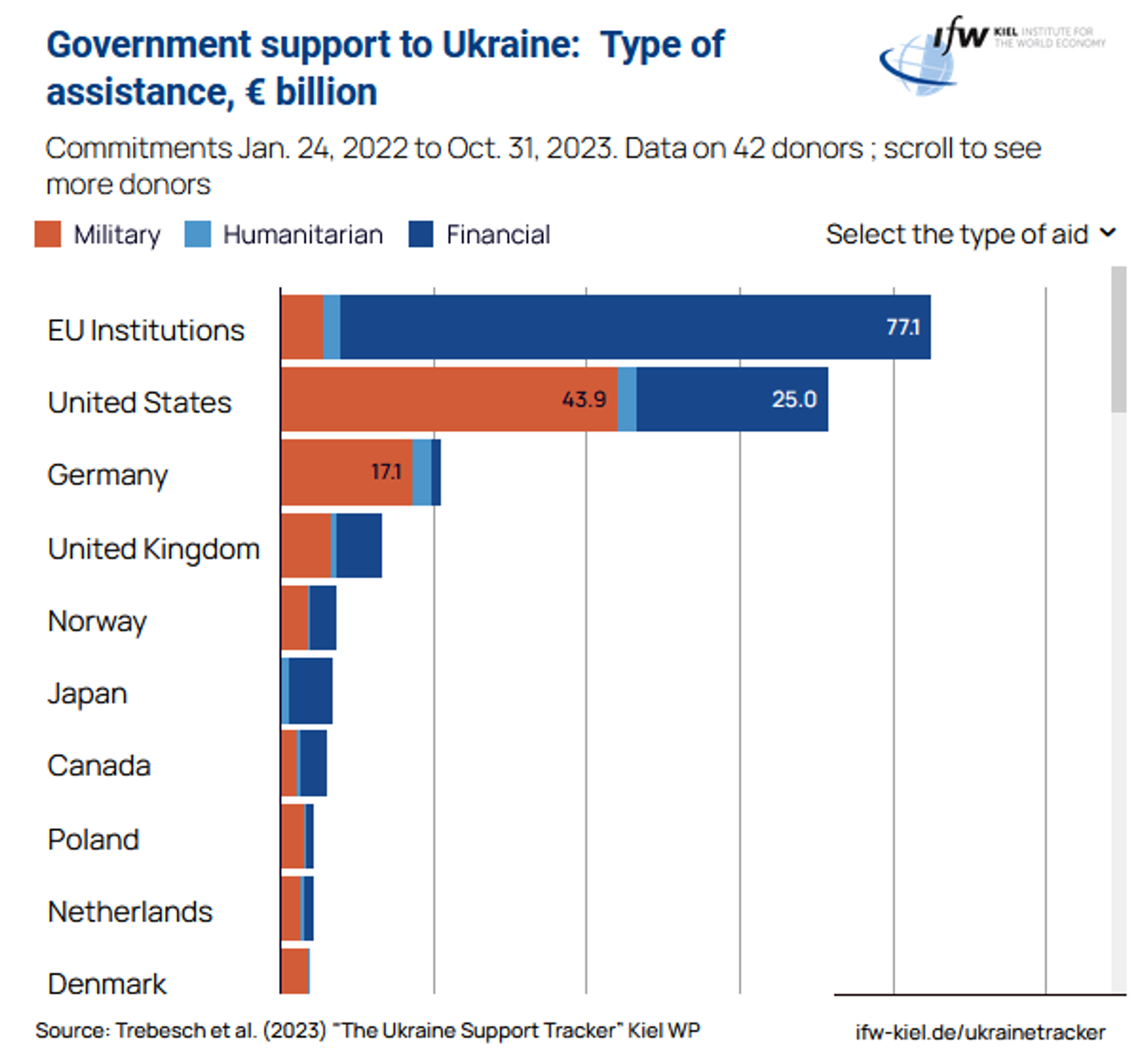https://sputnikglobe.com/20231214/eu-officials-privately-panic-over-prospect-of-pouring-billions-more-into-ukrainian-black-hole-1115582588.html
EU Officials Privately Panic Over Prospect of Pouring Billions More Into Ukrainian 'Black Hole’
EU Officials Privately Panic Over Prospect of Pouring Billions More Into Ukrainian 'Black Hole’
Sputnik International
EU leaders gathered in Brussels on Thursday for a two-day summit dedicated to the issue of possible Ukrainian membership in the 27-member political and economic bloc. The meeting comes amid long-standing concerns by some bloc countries and officials that Ukraine is simply too corrupt and economically backward to join.
2023-12-14T13:58+0000
2023-12-14T13:58+0000
2023-12-14T13:58+0000
world
ukraine
kiev
brussels
jean-claude juncker
volodymyr zelensky
european union (eu)
nato
ukrainian crisis
https://cdn1.img.sputnikglobe.com/img/103929/91/1039299109_0:47:1280:767_1920x0_80_0_0_6c3b61a51a26c2be38ab5ddc8cb9e291.jpg
Despite efforts to put on a brave face publicly and vowing to support Kiev “as long as it takes” in the West’s proxy war against Russia, EU officials admit privately that the crisis is ‘no longer a top priority’ for the day-to-day affairs of bloc countries, and question the rationale for pumping even more cash Ukraine’s way into a seemingly bottomless “black hole.”That’s according to reporting in a leading EU media outlet citing half a dozen senior EU officials and diplomats on the Ukrainian question.Along with the issue of Ukrainian membership in the EU, the bloc hopes to discuss the matter of some €50 billion ($54 billion US) in additional assistance to Ukraine amid ongoing wrangling in the US Congress about the fate of $61 billion in military assistance to Kiev. But as in the US, officials in Europe have threatened to block the support, with Brussels attempting to entice a hesitant Hungary to change its stance on the issue by unblocking €10 billion in frozen EU funds over long-running rule of law dispute this week.Budapest is not alone, according to officials, with other bloc members also concerned about the political consequences of offering Kiev more cash even as their own citizens’ needs are left unmet, with the issue particularly prescient ahead of bloc-wide elections to the European Parliament set for next June.“We now see an emerging group of countries who sometimes look like they have second thoughts about Ukraine becoming a member of the EU,” one anonymous EU diplomat said, pointing to a push by Austria to link the possibility of Ukrainian membership in the bloc to that of Bosnia. The former Yugoslav republic applied for EU membership in 2016 after more than a decade of negotiations, but its leaders have been left sidelined as the bloc moved forward with candidate status for Ukraine and Moldova last summer.Observers have also linked European officials’ growing Ukraine fatigue to the failure of Kiev’s counteroffensive (a fact admitted even by President Zelensky late last month, several weeks after his top commander called the NATO-funded and armed operation a “stalemate” and said there would be no “deep and beautiful breakthrough” against Russia). European observers expect the coming six months to be “brutal for Ukraine” as Russia ramps up its military production as arms deliveries by Kiev’s NATO partners are reduced.Ukrainian officials, aware of the danger, have turned to playing up the supposed threat of a Russian bogeyman to Europe, suggesting that if the Kiev regime is defeated, a European NATO power would be next (ignoring the fact that such an eventuality would likely trigger World War III).The European Union and the United States have already committed hundreds of billions of dollars in military, economic and humanitarian aid to Ukraine, with the top five donors - the US, the EU, Germany, the United Kingdom and Norway alone spending over €197.5 billion ($215.5 billion US) between January of 2022 and October 31, 2023, according to data by the Kiel Institute for the World Economy.Ukraine is completely dependent on the US and the EU for its survival, with Western countries estimated to pay for 70 percent of the government’s expenses, and the vast majority of its military equipment and ammunition supplies, thanks to non-stop Russian strikes on Ukraine’s military-industrial infrastructure.Kiev has made no secret of its aspirations to join the EU as a means to escaping growing holes in its budget, particularly as the national debt grows and private investors which lent the country money over the past two years close in to collect returns.In October, European media revealed that the EU would have to dole out some €186 billion to Ukraine if Kiev became a bloc member, with these funds not only draining Brussels’ already strapped cash reserves, but threatening to turn the EU’s Eastern European net recipients of EU assistance into donors.Along with the potential financial costs of EU membership for Ukraine are longstanding and pervasive concerns about corruption. “Anyone who has anything to do with Ukraine knows that this is a country that is corrupt at all levels of society,” former European Commission president Jean-Claude Juncker told German media in October. “Despite its efforts to date, it is not eligible to join, and needs massive internal reforms. We have had bad experiences when it comes to the rule of law. This cannot be repeated again,” Juncker added.
https://sputnikglobe.com/20231214/ukraines-eu-accession-to-take-many-years--dutch-prime-minister-1115575940.html
https://sputnikglobe.com/20231213/hungarian-pm-orban-says-will-not-allow-eu-to-make-mistake-by-starting-accession-talks-with-ukraine-1115551736.html
ukraine
kiev
brussels
Sputnik International
feedback@sputniknews.com
+74956456601
MIA „Rossiya Segodnya“
2023
News
en_EN
Sputnik International
feedback@sputniknews.com
+74956456601
MIA „Rossiya Segodnya“
Sputnik International
feedback@sputniknews.com
+74956456601
MIA „Rossiya Segodnya“
ukraine, pay, summit, membership, european union, assistance, aid, support
ukraine, pay, summit, membership, european union, assistance, aid, support
EU Officials Privately Panic Over Prospect of Pouring Billions More Into Ukrainian 'Black Hole’
EU leaders gathered in Brussels on Thursday for a two-day summit dedicated to the issue of possible Ukrainian membership in the 27-member political and economic bloc. The meeting comes amid long-standing concerns by some bloc countries and officials that Ukraine is simply too corrupt and economically backward to join.
Despite efforts to put on a brave face publicly and vowing to support Kiev “as long as it takes” in the West’s proxy war against Russia, EU officials admit privately that the crisis is ‘no longer a top priority’ for the day-to-day affairs of bloc countries, and question the rationale for pumping even more cash Ukraine’s way into a seemingly bottomless “black hole.”
That’s according to reporting in a leading EU media outlet citing half a dozen senior EU officials and diplomats on the Ukrainian question.
“Doubts are on the rise,” one official
said. “How desperate is the situation on the battlefield? How much more money will we pour into this black hole? Populists across Europe will ride this wave in the coming months,” they added, referring to the collapse of Ukraine’s counteroffensive, the tens of billions of euros in additional aid requested by Brussels, and the election victories of populist anti-war politicians in recent elections in Slovakia and the Netherlands.
Along with the issue of Ukrainian membership in the EU, the bloc hopes to discuss the matter of some €50 billion ($54 billion US) in additional assistance to Ukraine amid ongoing wrangling in the US Congress about the fate of $61 billion in military assistance to Kiev. But as in the US, officials in Europe have threatened to block the support, with Brussels attempting to entice a hesitant Hungary to change its stance on the issue by
unblocking €10 billion in frozen EU funds over long-running rule of law dispute this week.
Budapest is not alone, according to officials, with other bloc members also concerned about the political consequences of offering Kiev more cash even as their own citizens’ needs are left unmet, with the issue particularly prescient ahead of bloc-wide elections to the European Parliament set for next June.

14 December 2023, 11:14 GMT
“We now see an emerging group of countries who sometimes look like they have second thoughts about Ukraine becoming a member of the EU,” one anonymous EU diplomat said, pointing to a push by Austria to link the possibility of Ukrainian membership in the bloc to that of Bosnia. The former Yugoslav republic applied for EU membership in 2016 after more than a decade of negotiations, but its leaders have been left sidelined as the bloc moved forward with candidate status for Ukraine and Moldova last summer.
Observers have also linked European officials’ growing Ukraine fatigue to the failure of Kiev’s counteroffensive (a fact
admitted even by President Zelensky late last month, several weeks after his top commander called the NATO-funded and armed operation a
“stalemate” and said there would be no “deep and beautiful breakthrough” against Russia). European observers expect the coming six months to be “brutal for Ukraine” as Russia ramps up its military production as arms deliveries by Kiev’s NATO partners are reduced.
Ukrainian officials, aware of the danger, have turned to
playing up the supposed threat of a Russian bogeyman to Europe, suggesting that if the Kiev regime is defeated, a European NATO power would be next (ignoring the fact that such an eventuality would likely trigger World War III).
The European Union and the United States have already committed hundreds of billions of dollars in military, economic and humanitarian aid to Ukraine, with the top five donors - the US, the EU, Germany, the United Kingdom and Norway alone spending over €197.5 billion ($215.5 billion US) between January of 2022 and October 31, 2023, according to
data by the Kiel Institute for the World Economy.
Ukraine is completely dependent on the US and the EU for its survival, with Western countries estimated to
pay for 70 percent of the government’s expenses, and the vast majority of its military equipment and ammunition supplies, thanks to non-stop Russian strikes on Ukraine’s military-industrial infrastructure.
Kiev has made no secret of its aspirations to join the EU as a means to escaping growing holes in its budget, particularly as the national debt grows and private investors which lent the country money over the past two years
close in to collect returns.
In October, European media revealed that the EU would have to dole out some
€186 billion to Ukraine if Kiev became a bloc member, with these funds not only draining Brussels’ already strapped cash reserves, but threatening to turn the EU’s Eastern European net recipients of EU assistance into donors.
Along with the potential financial costs of EU membership for Ukraine are longstanding and pervasive concerns about corruption. “Anyone who has anything to do with Ukraine knows that this is a country that is corrupt at all levels of society,” former European Commission president Jean-Claude Juncker
told German media in October. “Despite its efforts to date, it is not eligible to join, and needs massive internal reforms. We have had bad experiences when it comes to the rule of law. This cannot be repeated again,” Juncker added.

13 December 2023, 09:38 GMT





